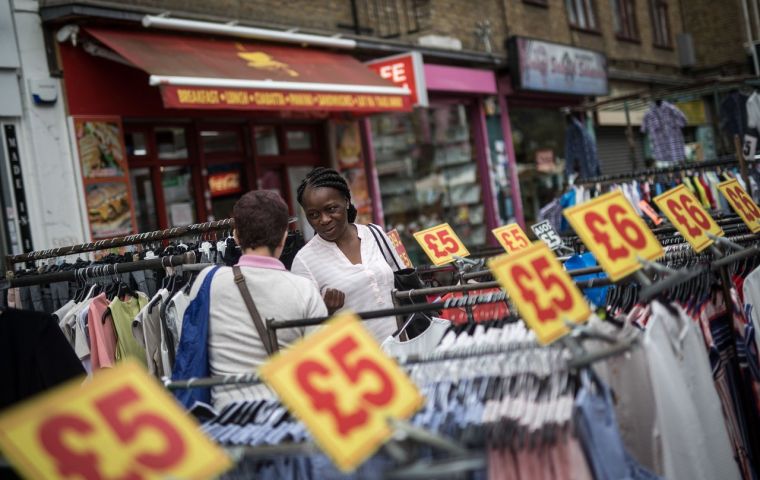MercoPress. South Atlantic News Agency
UK January inflation remains at 3%; slower food and raw materials prices
 Inflation was given a steep boost by the UK's vote in 2016 to leave the European Union. It prompted a fall in the pound, making imported goods more expensive.
Inflation was given a steep boost by the UK's vote in 2016 to leave the European Union. It prompted a fall in the pound, making imported goods more expensive. United Kingdom inflation remained at 3% in January, the same level as in December, as reported by the Office for National Statistics, ONS. In November it was the six year high of 3.1% and most economists were expecting a small fall in the CPI to 2.9%.
Last week, the Bank of England indicated interest rates might rise sooner than expected when it said it wanted to get inflation closer to 2% within two years rather than three.
Investors have been pricing in a good chance that rates would rise in May, with a second rise later this year, probably in November. Interest rates are currently at 0.5%. If the Bank raised rates in line with market expectations, they would reach 1% by the end of this year.
The ONS said that although petrol prices had risen by less than this time last year, the cost of entry to attractions such as zoos and gardens fell more slowly. It said, however, that after rising strongly since the middle of 2016, food price inflation now appeared to be slowing.
ONS senior statistician James Tucker said: “Factory goods price inflation continued to slow, with food prices falling in January. The growth in the cost of raw materials also slowed, with the prices of some imported materials falling.”
Inflation was given a steep boost by the UK's vote in 2016 to leave the European Union. It prompted a fall in the pound, making imported goods more expensive.
Chris Williamson, chief economist at Markit, said: “UK inflation came in higher than expected in January, adding further pressure for policymakers to hike interest rates again, possibly as soon as May.
”However, with mounting signs of economic growth slowing at the start of 2018, a May rate rise is by no means a done deal and will likely be dependent on the data flow improving in coming months.“
Mel Stride, the Financial Secretary to the Treasury, said: ”The good news is that inflation is expected to fall this year. We are helping cut costs for hard pressed families by boosting pay, cutting taxes for millions of people and freezing fuel duty at the pumps.”
The ONS reports a number of different inflation measures. It said the Retail Prices Index (RPI), which is used to calculate payments on government bonds, student loans and other commercial contracts, edged down to 4% from December's six-year high of 4.1%. Its own preferred measure, CPIH, which includes housing costs, remained at 2.7% in January, also unchanged from December.




Top Comments
Disclaimer & comment rules-

-

Read all commentsThe question is why is this piece appearing in Mercopenguin, a British government propaganda organ supposedly devoted to America, South America and the “South Atlantic”?
Feb 22nd, 2018 - 04:44 am 0The question is why is this piece appearing in Mercopenguin, a British government propaganda organ supposedly devoted to America, South America and the “South Atlantic”?
Feb 23rd, 2018 - 04:18 am 0Commenting for this story is now closed.
If you have a Facebook account, become a fan and comment on our Facebook Page!